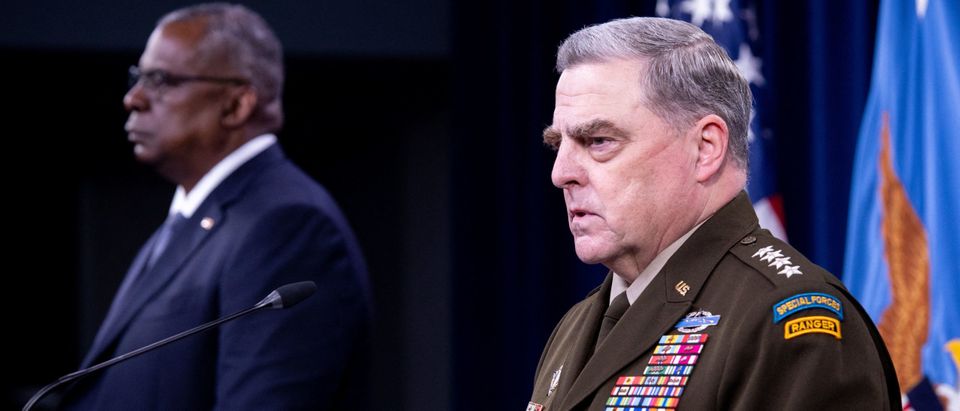What is it about four-star generals and chains of command?
Is it possible that they just can’t help themselves and, given an opening (or perceived opening), they insert themselves?
Congress should hold hearings as soon as possible about the recent allegations concerning Gen. Mark Milley, Trump’s chosen Chairman of the Joint Chiefs of Staff. In this role, Milley is the principal military adviser to the president of the United States. He does not, however, play a role in presidential succession in the event of presidential incapacity or in the nuclear chain of command.
If accurate, the revelations in the new book by “Washington Post” reporters Bob Woodward and Bob Costa suggest that Milley overstepped his role in conversations with his Chinese counterpart, with U.S. military officials associated with nuclear-weapons launch protocols and with House Speaker Nancy Pelosi.
Then there’s Milley’s role in our hasty departure from Afghanistan. What did Milley advise the president and when? Was his advice followed? Were there contingency plans? How did our Department of Defense preparedness square with the Department of State’s diplomatic efforts and intelligence gathered by our numerous intelligence agencies (CIA, NSA, DIA et al.)?
Milley’s alleged telephone call with House Speaker Nancy Pelosi suggests the general thought that President Donald Trump might become, or already be, unglued. Pelosi: “He’s crazy. You know he’s crazy. He’s been crazy for a long time ….” Milley: “I agree with you on everything.”
We need to know whether or not Milley initiated the Pelosi call.
We need to know whether, given his concerns about Trump’s mental stability, Milley ever spoke with Vice President Mike Pence or contemplated raising his concerns in the context of the Constitution’s 25th Amendment that prescribes how to handle presidential impairment.
We need to know whether Milley attempted to interfere with the clearly designated chain of command with respect to how and when a president launches a nuclear strike.
We need to know what prompted Milley’s two calls to his counterpart in China’s People’s Liberation Army, Gen. Li Zuocheng. China is not our only nuclear threat.
Uncertainty always surrounds presidential elections, and the January 6, 2021, Capitol Hill insurrection prompted national and international concerns. But did Milley have to say that he’d alert General Li in advance if the United States was planning an attack? What aspects of Trump’s behavior prompted Milley to worry about that possibility?
Perhaps some Daily Caller readers will remember another four-star Army general and former NATO Supreme Allied Commander Europe (SACEUR), Alexander Haig. In early 1981, Haig was Ronald Reagan’s Secretary of State. On March 30, 1981, Reagan was nearly assassinated by a lone gunman outside the Washington Hilton. Vice President Bush was in Texas.
Given what appeared to Haig (who was fourth in line for the presidency) as a potentially dangerous power vacuum in Washington, he raced from Foggy Bottom to the White House press room and announced to the world: “I’m in control here!”
Haig’s intentions were good, but his precipitous actions and words were inappropriate and roundly criticized. At least to his credit, however, he acted with full public transparency and not behind the scenes.
Years ago, while in law school, I did some poking around in the Uniform Code of Military Justice. Article 89 states: “Any person subject to this chapter who behaves with disrespect toward his superior officer shall be punished as a court-martial may direct.” I’ll leave it to the military lawyers to decide whether the Commander-in-Chief, who holds the highest military rank, also qualifies as a “superior officer” in this context.
General Milley is a 1980 graduate of Princeton University (also my alma mater) where he majored in politics. For decades, Princeton has prided itself on its inspiring motto, “Princeton in the Nation’s Service.”
Serving our national interest, however, is usually not conducted by freelancing or flaunting established rules, protocols and chains of command, especially by senior military officials. Civilian oversight of our military is a bedrock of our constitutional democracy.
Woodward’s reporting has occasionally raised questions of accuracy. I’m willing to give Milley the benefit of the doubt, but he has a lot of questions to answer.
The congressional inquiry into Milley’s actions and judgment, now scheduled for September 28, must be nonpartisan, open to the public, thorough, and without prejudice. Milley may have sound reasons for his actions. If so, let him present them. The American public and relevant civilian and military authorities can then pass judgment.
Charles Kolb served as Deputy Assistant to the President for Domestic Policy from 1990-1992 in the George H.W. Bush White House


